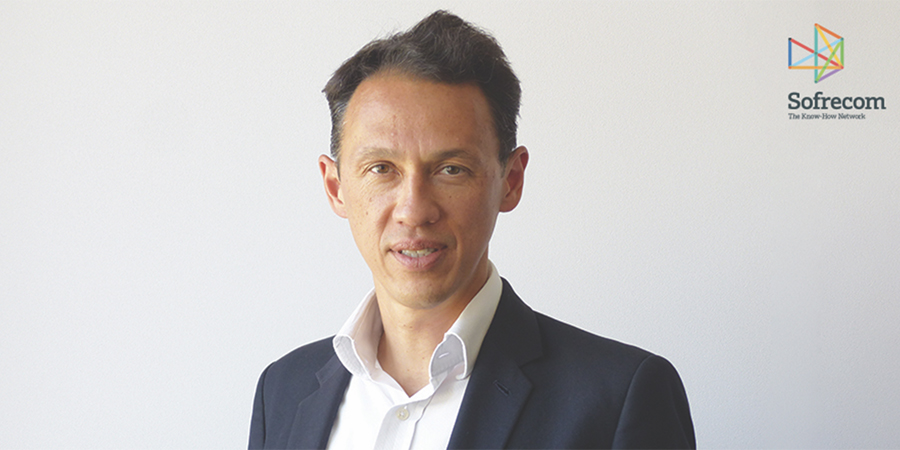In an exclusive interview with Telecom Review, Sofrecom Group’s CEO, Guillaume Boudin, detailed the company’s biggest challenges in the telecom industry and how Sofrecom is helping to meet them head-on. He also shed light on the role of technology in the decarbonization of the telecom sector.
What do you see as the biggest challenges facing the telecoms industry when it comes to decarbonization?
Telcos face growing pressure from customers, investors, and regulators to achieve their net-zero targets and do their part to solve the climate crisis. As telecommunications companies ramp up their decarbonization efforts, many executives are overlooking a key part of the equation: There’s a ton of upside for their businesses.
Most telcos are far from decarbonizing their own operations. Most telcos have announced commitments to achieve net-zero emissions, but so far, few have followed through with real planning and execution. Even telcos that have already crafted a decarbonization strategy will likely need to continuously revise it because it will quickly become obsolete.
Decarbonization tools that were [previously] out of reach or not economically attractive are now increasingly accessible. That’s because advanced batteries, solar panels, and other technologies that support renewable energy capture and other decarbonization initiatives are progressing rapidly, and their adoption costs are dropping.
One of the challenges that industry executives would point to is that around 85% of telcos’ carbon emissions are Scope 3 emissions attributed to suppliers and partners.
But many telcos have yet to fully evaluate how they can strengthen their businesses through their actions for carbon footprint reduction.
We believe that there are four areas of significant business opportunity for telcos that take full advantage of their decarbonization efforts:
- Climate change will likely increase the usage of telecom services as companies across industries seek to reduce their own carbon emissions by increasing remote operations, work-from-home and digitization.
- With high inflation on raw materials and energy costs, most of the time, decarbonization and cost reduction will go hand in hand. This is the case, for instance, when telcos are moving to solar energy or rolling out circular economy projects.
- With the growth of environmental awareness, more and more consumers are ready to pay a premium for “greener” services. Telcos that can successfully differentiate themselves this way will attract these customers.
- Lastly, telcos can create additional revenue streams through new products and services that play a significant role in helping companies across industries decarbonize. Telcos could also use their expertise in bundling offers to promote new “green solutions” alongside their partners.
What role do you see technology playing in the decarbonization of the telecoms sector, and what innovations will be most important to this end?
Even if it’s much less compared to other industries, Digital equipment manufacturing, networks and datacenter operations are generating direct carbon emissions.
But more importantly, Digitalization has the potential to fight against climate change. Digitalization has become an indispensable tool for achieving the objectives of a green economy:
- Digital solutions can promote climate protection, clean air, intact soil and the preservation of biodiversity.
- Digital offers solutions to monitor, mitigate and adapt to the impacts of climate change.
- Digital technologies offer the opportunity to help address the world's most pressing climate concerns and enable the much-needed shift to a circular economy.
- Dematerialization can help reduce emissions and solid waste emanating from non-digital sectors of the economy.
Digital technology is also accelerating education all over the world. Increased awareness and education can have a positive effect on promoting a mindset of environmental responsibility among stakeholders, including the ICT sector, policymakers, citizens and academia. Different ecosystem stakeholders must take responsibility for this very complex issue and take concerted and timely action.
How is Sofrecom helping to meet these challenges?
As telco sector experts, we are working for a more inclusive and sustainable digital world. We help our customers to:
- Make decisions — assisting them in the definition of their green strategy by learning from the industry best practices and trends.
- Get reliable, objective, and detailed data regarding their activity's impact.
- Convert Green challenges into an operational action plan: think, build and run approach.
- Build an energy efficiency plan tailored to their context: energy cost assessment, energy savings master plan, design and deployment of an energy consumption measurement solution.
- Launch and conduct a circular economy strategy.
From defining a CSR strategy to implementing it operationally, our approach is all-encompassing, based on interaction and co-construction.
To learn more about decarbonization, we are glad to share our latest white paper:










